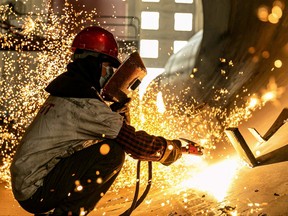When we’re no longer able to manufacture the high-tech components for new fighter jets or submarines, who is going to make them for us? Russia? China?

Article content
Made in China: it’s the label you see on many products sold in stores throughout the country. The odd time, you’ll see a product manufactured in some other country. But you rarely see a product that’s made here in Canada.
We used to make fridges and phones in Canada. We even built the world’s fastest fighter jet (I once worked in a factory that made parts for the supersonic plane).
Advertisement 2
Article content
Article content
When we were a manufacturing powerhouse, our living standards were the envy of the world. Today, as our manufacturing sector shrivels, our living standards are likewise dropping.
China, on the other hand, is a rapidly rising economic and military superpower. The Chinese used to buy their fighter jets and aircraft carriers from other countries. Now they mostly make their own.
Back in the 1990s and early 2000s, it was popular for economists to say that advanced economies like Canada and the United States no longer needed to manufacture products. This work, they argued, could be offshored to countries where it could be done more cheaply.
Instead, they claimed that we should focus on building wealth through software and the knowledge economy — products and services that didn’t require physical input or materials like steel and plastic.
According to the experts, we’d all end up being highly skilled knowledge workers creating software and manipulating data, and we’d be much better off, no longer needing to dirty our hands digging minerals from the earth and toiling on factory assembly lines.
Article content
Advertisement 3
Article content
I never bought into that line of thinking — and not just because I worked in the so-called “old economy” of manufacturing. To me, a country that abandons its manufacturing is doomed to fall behind and decay.
Over the years, we’ve become less and less preoccupied with creating real wealth, and more and more engaged in the process of transferring and redistributing the declining wealth that we do generate. As a result, we’ve slowly abandoned our farms and factories and today import many of the products we buy and the food we consume.
The consequences of relinquishing our manufacturing sector are serious and far-reaching. A decline in manufacturing capability will lead to a decline in the country’s technology base and technical know-how.
The manufacturing industry and its supply base jointly develop a vast array of technologies and products — everything from sophisticated electronics to new composite metals and plastics. For example, when I was chair of Magna International, we joined forces with Apple to develop the touch-screen glass technology for the iPhone, a spin-off product that arose from our core automotive business.
Advertisement 4
Article content
The technologies incubated in the manufacturing sector have applications not only in a wide range of industries but also in the defence industry, which is vital for safeguarding our freedom and the protection of democracies around the world.
There was an eye-opening article published by the Royal United Services Institute in the United Kingdom two years ago, which asked the question: “Can the West still provide the arsenal of democracy?” Its conclusion was a resounding “no.” Not only do we no longer have the manufacturing capacity to fight a crude war like the one Russia and Ukraine are engaged in, we’re also losing the ability to produce advanced new weapons.
When we’re no longer able to manufacture the high-tech components for new fighter jets or submarines, who is going to make them for us? Russia? China?
At the end of the day, the continued deterioration of the manufacturing sector in North America and Europe will impact a wide range of other industries, including defence, and it will rob us of one of our chief engines of technological innovation.
To halt this erosion, we need to first work on restoring our technical skills base. That means training hundreds of thousands of skilled tradespeople across Canada through the creation of technical trade centres in every province focused on every industry from mining to manufacturing.
Advertisement 5
Article content
Technical skills will give us the foundation to rebuild our manufacturing industry, revitalize our economy and restore our prosperity.
If we don’t protect and foster our manufacturing base, then years from now, we will be asking ourselves: how did China become so strong? The real question we should ask is: why did we stand idly by and watch the dismantling of the industries that made us prosperous in the first place?
National Post
Frank Stronach is the founder of Magna International Inc., one of Canada’s largest global companies, and the Stronach Foundation for Economic Rights.
Recommended from Editorial
Article content
Bagikan Berita Ini


















Comments